What we’re using in 2021: English
Kate’s English Resources
Storytellers Word a Day – Mrs Wordsmith
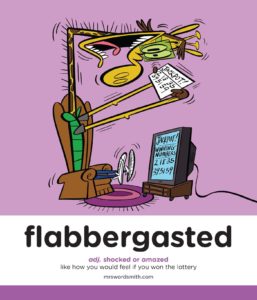
My Miss Eight isn’t a wordy one, so I bought this Word a Day flipchart just to help me make a habit of talking about words and explicitly practice deciphering the meaning of unfamiliar words using context clues with her. I use this with both of my children so she doesn’t feel singled out. I encourage Mister Twelve to use the words not just correctly, but creatively. They both have a habit of saying, “The {OBVIOUS NOUN} was very {VOCABULARY WORD}.” I especially like the vocabulary words that have an etymology included as this adds a different flavour to the usual conversation. Mister Twelve likes his history and Miss Eight hates the inconsistencies of the English language. Etymology is illuminating for them both but in different ways.
This is an easy and reasonably inexpensive way to do a bit of English every day. The flipchart sits by the breakfast table and we make a habit of using it as part of our breakfast routine. And also lunch and dinner. They have to use the word to be excused from the table because Grandpa said if you can use a word three times then you own it. And eating is the only thing we do three times a day to help me remember to do that!
KS3
Legends of Druidawn – Outschool
This is an online role-playing game for 9-14-year-olds with writing assignments included. I’ve talked about this on the podcast before. This was Mister Twelve’s breakthrough in independent writing. In the last two years, he has gone from dictating his thoughts to writing independently to proofreading his work to typing up his own work. There are few areas in his life where I’ve seen him push himself like this. I knew he was capable, but I could never provide him with the right motivation to do so. These classes were just what he needed.
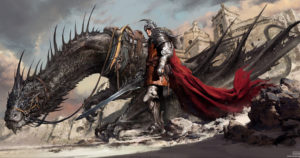
Legends of Druidawn is similar to Dungeons and Dragons. Your child can go on adventures from one to eight weeks long. There will be plenty of monsters to battle and puzzles to solve in the online sessions. Melissa now has rolling sessions your child can dip in and out of. She also recently added Business Ownership for (Druidawn) Knights, which Mister Twelve completed and thoroughly enjoyed. Each session has optional homework with major incentives for choosing to complete the homework. The assignments cover a good mix of writing purposes – letters, dream sequences, flashbacks, dialogue, advertisements and reviews. Character development is an inevitable element of each piece of writing.
Arrows – Brave Writer
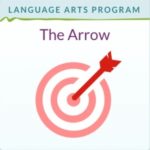
I use single Arrows when Mister Twelve is between Druidawn sessions. I print out the week’s information and hand it over to him to read through. He then explains it to me because that’s actually how he learns best (which incidentally drives his sister insane because she thinks he thinks he knows it all). He likes to get silly with the week’s writing assignment. But mostly he likes more reading in his schedule and less work!
I like that the Arrows point out elements I wouldn’t think to, because I am not an English teacher. When he explains these elements to me we usually have an interesting conversation. We naturally tend to dissect literature philosophically, whereas the Arrows are better at teaching him to dissect literature as he would be asked to in a test situation, but in an interesting way.
I don’t find that Mister Twelve is particularly motivated to do the Arrow’s big writing assignment. But I think that’s because he knows he has time to complete it and for the ADHD child there is only ‘do this NOW’ and ‘I’ll worry about that LATER’ so it tends to be far too much to complete after all of the procrastination. It requires we work on a different skill that is not so much writing as it is time management. A very useful skill, but not the one I was looking to work on with this resource.
Beowulf Grammar – Guest Hollow
A friend of ours recommended Beowulf Grammar to me in an off-hand manner when I mentioned how much our Mister Twelve has always loved dogs. I thought, aw, that’s cute. A grammar program with a little dog on it might entice him to at least have a cursory look through some information on grammar and who knows what that might lead to.
Ha! This is so much more than a grammar program with a little dog on it. I don’t think I ever learned to diagram a sentence myself. Thank goodness she provides a teacher’s manual as well! This took Mister Twelve two years to complete. He just finished it this month. And was kinda sad about it.
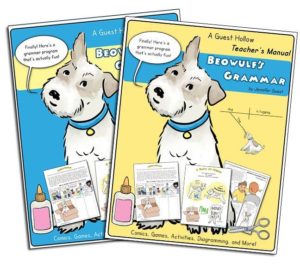
KS2
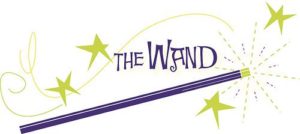
The Wand – Rooted in Language
I like to think of this as Arrow light. For each Wand unit we read a story, we discuss a literary element, we look at a passage for capitalisation, spelling and punctuation. Miss Eight copies the passage. A spelling list for the week is included, but we don’t use this. I DO use their spelling rules and literacy folders for discussing spelling rules though. I learn stuff from this curriculum (that I wish I had known when teaching Mister Twelve to spell). Grammar lessons for the week are also included, like parts of speech, base words and endings, compounds words, tense, etc.
Explode the Code
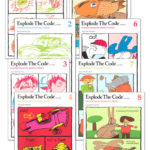
Explode the code advertises itself as ‘Essential lessons for phonics mastery.’ Miss Eight showed an early preference for writing over reading and we’ve travelled a long road of learning to read through writing. But that’s another post. These books are repetitive and I had boxed them away as they drove Mister Twelve nuts when he sped through learning to read. But they turned out to be perfect for Miss Eight.
Billie B Brown – Sally Rippin
I just wanted to throw this set out there for anyone with a little emergent reader who needs lots and lots of repetition like Miss Eight. The sets I have lying around the house from Mister Twelves learning-to-read days just moved on too fast and there were only so many times Miss Eight was willing to read the same book as she practised.

Katie’s English Resources
The backbone of our Language Arts is lots of books and audiobooks. We have had an annual audible subscription for years (even though I would love an affordable alternative), we use our local and county library services *a lot* and now the kids have access to media devices of their own, they all use Libby to borrow ebooks and audiobooks from our library. We read a lot of graphic novels too and have books that explore how graphic novels work because it’s something we are all interested in to different degrees.
We still read aloud (though our rhythm has had to flex a great deal as the children get older), and I use that to read books that either we all want to enjoy together or to read books the kids probably wouldn’t read on their own. Reading together means that we get to talk about the books we are reading together, comparing them to other stories we have read, or real-life events that we know about or have experienced. I love these discussions, and they happen all over the place. Of course, they don’t happen with every book, and that’s fine.
I also read non-fiction as part of our morning time (which is currently our afternoon time.) These are usually books that relate to whatever we are digging into at the moment. (Right now we are following our interest in the fall of apartheid in South Africa – I have some great recs to share with you soon.) This is all about us experiencing language, and writing, and how people share stories and ideas. As I say, it’s our backbone, and we have been building our stamina for it for years now.
My plan this year is to put a lot of small opportunities to write in front of my children. They have always written when self-motivated, but are reticent to do a lot of written work as part of their academics, and a lot of our education has been conversation and dictation based. But I want them to slowly build up their writing stamina.
For my eldest, who loves Dungeons & Dragons, we have been working together on a one-shot, which is a story you can play in one or two evenings. We plan it out and discuss what needs to come next and then work out what is a manageable amount of work, set a deadline, write it up as a to-do list in his notebook, and then he is free to do the work when he likes. So far that is working really well, and in the end, he will have a PDF of a game that he can run for friends or the family. I’m hoping we can do one of these a term. I’ll let you know how we get on.
Last year we did some work from Classical Academic Press‘ Writing and Rhetoric, which was good. The exercises were short, and it did some really interesting things with the stories it used – getting you to add more detail to the bones, or summarize it in as few words as possible. I would have continued with it (even though we had to import it, which was a pain) but my oldest two wanted a change. We have just started using Blossom and Roots’ language arts course for grade 4 (Year 5 in the UK), which centres on ‘the hero’s quest’. I am using it for all three kids, are adjusting it to their abilities and needs. Mostly I picked that one because it included books I thought we would really enjoy and because we owned, and hadn’t read the first book for the year – Mrs Frisby and the Rats of Nym.
So far we are really enjoying it, and I have rejigged our routine this term to add in the work. We still have lots of discussions, but my older two are finally able to just get on with the copywork without serious complaint, because it doesn’t take them long to write it out, and the built-in grammar lessons are a good reminder of all the stuff we have worked on in the past and needed revisiting in little ways.
Part of the change is that they are older, and more ready to do the work and not find it too hard or overwhelming. But also I am different. In the past, I have found language arts curriculums too complicated, overwhelming and too time hungry. Now I see that small writing stepping stones, especially ones that they are interested in will help them write more as they get older.
